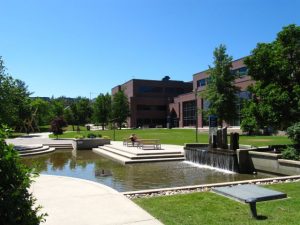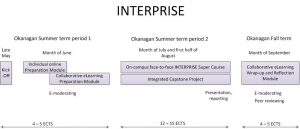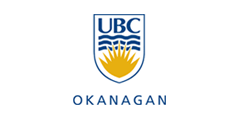After the CDIO Annual Conference in June, an icewalk on the Athabasca glacier, a visit to Lake Louise with its vivid turquoise waters, followed by a hike to Lake Agnes in the Banff National Park, and spectacular views of the impressive 140 m deep Helmcken Falls and the 20 m deep but broad Dawson Falls that crashes down a rough bed of lava rocks in the amazingly quiet Wells Gray Provincial Park, I arrived at the Okanagan’s brand new campus of the University of British Columbia (UBC) in Kelowna.
Not just to say hello. I was invited to join an in-depth think session with the UBC development team of an interdisciplinary, hands-on curriculum that will complement monodisciplinary study programmes at our universities and so better prepare the students for a career in innovation activities. I am excited and enthusiastic about this curriculum because it is all about innovation, entrepreneurial and collaborative skills. All Master graduates of any engineering studies will need the mastery of these skills for a successful career in tomorrows’ world.
Integration or addition?
The training of innovation, entrepreneurial and collaborative skills is underexposed in many of today’s Master programmes. That is why TU Delft has put them higher on their educational agenda, the Dutch 4TU.Centre for Engineering Education has prioritised the research, training and assessment of these skills in their activity plan, and I was invited to share my thoughts with the team.

UBC Okanagan’s brand new campus (private photo).
The deficiency in Master education is actually much broader than just the missing entrepreneurial and innovative behaviour. I know so many engineering programmes that are struggling with the training of the academic and professional competencies: asking the right questions, collaborating in an intercultural context, communicating solutions, thinking visually, thinking out loudly, autonomy, systems engineering, project management, qualitative modeling of problems, and many more.
Most of us know the most effective way is to integrate the education of these skills within the existing disciplinary courses. But we also know by experience, how difficult this is to achieve in the disciplinary context and organisation of our research universities. That is why UBC has taken the initiative for a complementary programme for professional and career development to fourth-year undergraduates and first-year Master students of disciplinary studies.
Interprise??
The programme has got the name Interprise. It stands for Innovation, Interrelation, Intercultural, Interdisciplinary, Entrepreneurial, Enterprise. Its goal is to complement disciplinary study programmes with employable skills by an interdisciplinary, hands-on approach to being entrepreneurial and innovative in practice. It includes:
- Group dynamics and leadership
- Communicating with different audiences
- Appreciating social and economic context
- Using quantitative data intelligently
- Managing projects
- Behaving entrepreneurially
The UBC development team has many disciplines onboard: arts and sciences, engineering, management, philosophy, education, and creative and critical studies. At the meeting I noticed a very open and positive team spirit, which is the basis for successful team teaching. All members are eager to learn about the different ways of thinking, the different perceptions, and the interrelation between arts, sciences, technology and management.
The outcome of the think session
Below I describe the raw outcomes of the think session, with interesting insights in the discussions and trades that we made. There is still a lot of fine tuning, planning and development to be done before the kick-off in May 2018.
Learning objectives and volume
The most important aspect was the volume of the Interprise programme. Starting from the set of high-level learning objectives that had more or less already been agreed upon, the team proposed a 20-25 ECTS programme (ECTS is the standard of the European Credit Transfer and Accumulation System that expresses the volume of learning based on the defined learning outcomes and their associated workload). The study programme will run over a period of four months from kick-off till completion, although not fulltime all the time.
It is composed of a 4-5 ECTS Preparatory Module, a 12-15 ECTS on-campus phase with an intensive and challenging Interprise Foundations Super Course and the Integrated Capstone project, and a 4-5 ECTS Wrap-up and Reflection Module with reflections on team and personal behaviour and performance. The subject of the Integrated Capstone project resonates with the disciplinary backgrounds of the students. The project culminates in a report and plenary presentation event on-campus.
Residence time on-campus
One of the most important discussion points was also the residence time on-campus. To make a teaming up of Canadian and non-Canadian students possible, the schedule has to be aligned with the Canadian and Western Europe academic calendars (which are not uniform either). The development team considers five to six weeks on-campus with face-to-face education as the bare minimum to develop a cohort, given that the student population is very diverse with respect to level (Canadian undergraduates and oversees’ Masters), disciplines and nationalities.

Possible concept for the Interprise curricular structure.
Blended delivery
These two ingredients lead to a blended delivery of the programme: both the Preparatory Module and the Wrap-up and Reflection Module are partly individual/online, partly team-based/online through collaborative eLearning. E-moderators stimulate human interaction and guide the students in their online learning activities.
Project-centric curriculum with spiral teaching
The programme is “project centric”. The student teams feed their knowledge about their own discipline and the foundational content taught in Interprise, into the capstone project that runs simultaneously with the on-campus teaching of the Interprise super course. The subject of the capstone project resonates with the subjects of the disciplines, and is about the sorts of challenges that are faced by internationally connected enterprises and involves both multiple academic disciplines and industry.
The lecturers apply “spiral teaching”, which means that students will see the same subjects through a different lens, with each encounter increasing in complexity and reinforcing previous learning.
Social psychology as the binding element
The disciplinary base of the super course is the foundation, with the subjects communication, ethics, data management, project management, entrepreneurship and innovation. Social psychology of intergroup relations will be taught as an integrating course and will be the guiding principle. It has its emphasis on communication across disciplines. Students will learn to ask the right questions with concepts and knowledge from different fields, disciplines and experiences, and to think from alternate perspectives and learn to apply professional standards to conduct and action.
Students
Obviously, the Interprise programme demands the participating students to be ambitious, highly motivated and persevering. They have to start working part-time through individual and collaborative eLearning in June and complete the programme in September. Which means it covers periods where students probably also have other obligations at the home university in parallel. Obviously agile students in study programmes that accommodate a substantial volume of 20 to 30 ECTS freedom of choice are best positioned.
Subject matter
For those of you who want to get a better flavour of the content of the Interprise super course as it is in the minds of the development team (it’s a flavour and for sure not definite or complete):
- Hands-on experience about interaction with different audiences, the awareness, use and interpretation of body language, how to pitch ideas and projects, and how to collaborate in a creative workplace.
- Exploration of the social and economic context through a focus on policy issues related to human and economic development.
- Basic research methodology and statistical analysis to help students be intelligent consumers of data.
- Project management, including initiating, planning, executing, controlling, and closing projects. Managing the scope, costs, schedule, risks, and human resources in projects.
- Entrepreneurial behaviour in small enterprises and organisations, including appreciation of the challenges associated with creating a new venture.
- Theoretical and methodological issues within the domain of intergroup relations.
Viability
We live in a world where the current breed of students increasingly demonstrates a Do-It-Yourself ethic. They look for study programmes that offer substantial flexibility and freedom. They want to establish a coherent Master programme by themselves, that combines deep working knowledge of engineering fundamentals with education that aligns with personal needs, ambition and interest. In combination with the rise of E-learning it leads to a demand of unbundling curricula into separate modules, online courses, micro-credentialing of MOOCS at Master level and so on. We will soon see a market with personal coaches and brokers of accredited courses.
Interprise has the potential to become a winning concept in this world. Most, if not all students of Master engineering programmes have to prepare for innovation activities that are aimed at the development of new and complex products, processes, systems and technologies, in a social context that is highly interdisciplinary, hyperconnected and global.
From spoon-feeding to teaching what is needed
When you are a follower of my blogs you may remember what Richard Brandson said about entrepreneurial and innovation skills’ training at universities in my blog “Why entrepreneurial behaviour is a must for all young engineers“. In that blog you also read the following quote:
“Entrepreneurial behaviour no longer in the margin of a Master curriculum or as an extra-curricular course for the happy few, but as an integrated competence development pathway for all”.
Many Master’s in engineering do not come up to the mark in this respect. In the past 30 to 40 years we have been teaching what we think is best to teach. In the next decade education will be more demand-driven, i.e. what students need for successful employment. It would be better if the traditional slowly moving universities anticipate to this change and choose either to integrate the development of these academic and professional skills in their Master curricula, or create sufficient space to accommodate complementary accredited programmes or courses that students take off the shelves from other universities, institutes or organisations.
In April 2017 the European Council of Engineering Deans forecast that it’s not university higher management but students who will become the change agents for higher engineering education. Increasingly they will refuse spoon-feeding by rigidly structured curricula but choose what really matters.






